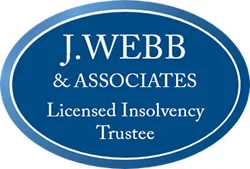F.A.Q. Debt Proposal
J.Webb & Associates – Serving Ottawa, Brockville, Belleville & Kingston
Ottawa Bankruptcy Trustee | Ottawa Licenced Insolvency Trustee
613.820.2100
PROPOSAL F.A.Q.
J. WEBB & ASSOCIATES
What impact will a consumer proposal have on my credit rating?
The consumer proposal brings your credit rating down to an R7 and this grade remains on record for 3 years after you have fulfilled all obligations contained in the proposal. During your proposal period your rating reverts to an R9 indicating bankruptcy.
How much does it cost?
The cost of a consumer proposal varies case by case. Trustees fees and costs are set by the federal government and are usually paid by your monthly installments.
How will filing a consumer proposal affect my spouse?
That depends on whether or not you have joint debts.
How will my spouses assets be affected by my consumer proposal?
Assets owned entirely by your spouse or partner are not considered in your consumer proposal unless the asset in question was recently transferred to your spouse.
Can I file jointly with my spouse?
Yes you may file a joint consumer proposal with your spouse if you have joint debts. This avoids paying double the fees and costs to the Trustee.
Will legal actions continue after my consumer proposal?
Filing of a consumer proposal immediately stops substantially all legal claims, garnishments or other legal proceedings. If you are served with legal or collection notices after your consumer proposal, we will immediately advise the creditor and put an end to the proceedings. Exceptions are legal proceedings with respect to alimony claims, spouse and partner support claims and child support claims.
What happens to my debts in a consumer proposal?
Filing a consumer proposal does not terminate or extinguish your debts but it does put a freeze or stay of proceedings on them. This means that your creditors may no longer continue collection or garnishment proceedings against you. There are some exceptions to this. Contact our office and we will be happy to discuss the exceptions with you. Legal liability to pay your debts, except those listed under section 178(1) of the Bankruptcy and Insolvency Act, is terminated or extinguished upon completion of the consumer proposal.
What is a section 178 debt?
The debts listed under section 178(1) of the BIA include: court fines, penalties and restitution orders; support arrears; an amount owed due to fraud or theft while acting in a trust or fiduciary capacity; debt attributable to the obtaining of property or services by false pretences or fraudulent misrepresentation; damages awarded by a civil court in relation to intentionally inflicted bodily harm, sexual assault or wrongful death resulting therefrom; and certain student loans.
What happens to my credit cards when filing a consumer proposal?
When you file a consumer proposal you are required to turn over all of your credit cards to the Trustee whether or not amounts are owed on these cards.
What happens to the co-signer of my loans if I choose to file a consumer proposal?
A consumer proposal does not remove your creditors rights to collect from the co-signers of your loans. Your co-signers will have to pay the debt in your place but may be entitled to a dividend instead of the creditor.
How can I rebuild my credit?
Good credit is based on responsible and positive credit activities recorded on your credit bureau report. Responsible and positive credit activity means paying on time every month. Your goal is to maintain a credit rating of R1 for each of your active creditors.
What is a secured credit card and how do I get one?
A secured card is a card secured by funds you have deposited with the bank. The card looks like a credit card, and acts like a credit card but will have available credit limited to the amount of money that secures the card. To learn more about secured cards, consult the following website of the Financial Consumer Agency of Canada www.fcac.gc.ca . You will learn more about how secured cards work and which banks and companies offer them.
Can my tax debt be included when filing a consumer proposal?
Yes, your income tax debt can be included. Income tax debts are not considered secured debts. Certain exceptions may apply to current year tax debt. Contact us for more information.
Can my student loans be included when filing a consumer proposal?
Yes. Student loans cannot be discharged unless seven years have passed since you were last a student.
If I file a consumer proposal, what happens to my tax refunds, GST/HST refunds, Ontario Trillium Benefit, and monies that I receive for my children (ie. Child Tax Benefit, Universal Child Care Benefit, Baby Bonus)?
A consumer proposal is simply an interest free repayment contract which may provide for debt forgiveness. Your monthly payment is based on your budget. As a result of this being a repayment contract, none of these benefits are seized by the Trustee unless the contract provides for same.
